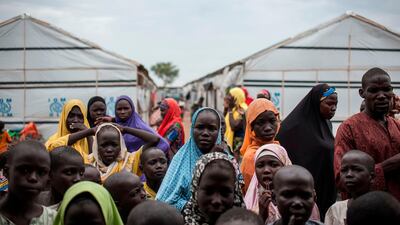Climate change does not directly spark conflict, but it does help to light the fuse by exacerbating stresses on natural resources. When peace finally returns to places such as Syria and Yemen, one of the most important questions we will face is how reconstruction can address climate challenges that heighten the risk of conflict.
In addition to many other longstanding social and political problems, the civil war in Syria was partly fuelled by a prolonged drought that devastated agricultural land, ravaging crop yields and doubling food prices. It is telling that the violence erupted after 1.5 million disenfranchised people migrated to already over-populated cities to find work.
With temperatures in the Middle East and North Africa (Mena) rising faster than the global average, this is a pattern that is set to repeat itself elsewhere. The population of this region, already the world’s most water-deprived and dependent on food imports, is projected to double by 2050, putting resources under enormous pressure. Climate change could trigger a further decline in food and water provision of 20-40 per cent, with increased droughts and heatwaves likely.
Climate also contributes to the rise of terrorism. In Iraq and Syria, organisations such as ISIS capitalised on the damage wrought by climate change, recruiting impoverished farmers whose lives and incomes had been wrecked. In Nigeria, the emergence of Boko Haram can be linked to environmental crises in the country's north.
Transformative policies are needed in the Middle East to make development climate-resistant, and the overriding priorities must be water and food security. Water scarcity – already acute – will be worsened by increasing desertification, rising temperatures and the exhaustion of aquifers. Adaptation efforts should concentrate on reducing waste, efficient management of water, harnessing new sources of clean water, such as desalination, and increasing use of renewable energy sources.
Extreme weather, combined with reduced water availability, meanwhile, will reduce agricultural production, leading to food shortages. To ensure food security, the planting of drought-resistant crops as well as the use of drip irrigation and other resilient farming techniques should be a critical component of any broader security approach for the region.
We should view the effects of climate change as an early-warning system to start building resilience. This will help counter further destabilisation and can be extended across the whole region as peace returns. Many relatively stable Mena countries are already heeding this call.
Saudi Arabia, for example, is the world leader in desalination, with 27 plants around its coastline. It is planning to invest $200 billion to produce a massive 200 gigawatts of solar energy by 2030.
The UAE, too, is on a clear path to build a green economy and a sustainable lifestyle for its residents. Masdar, the Abu Dhabi clean energy company, has invested around $2.7 billion in projects in the UAE and around the world over the past 10 years, with 1 gigawatt of installed capacity and another 0.7 gigawatts under development.
Egypt, Jordan and Tunisia, meanwhile, treat a significant part of their collected wastewater, although they are still unable to implement its reuse at scale. Agricultural production in Egypt is especially vulnerable to the impacts of global warming and other effects of climate change. The country’s Nile Delta, where more than 20 million people live, and which is considered the main engine of the country’s agriculture, is particularly threatened by rising sea levels.
Jordan, which has seen an influx of refugees from the war in Iraq and Syria, has become a focus for technological research in the water sector. Scientists there are working on low-pressure drip technology that maximises the energy-efficiency of crop irrigation.
It is also heartening to see Morocco, supported by international donors, completing work on a vast solar plant the size of 200 football fields in its southern desert – one of the biggest projects of its kind.
These bright spots, however, are just a fraction of what is needed. Efforts to adapt infrastructure such as water, agriculture and energy to a changing climate can only be scaled up with focused leadership and support from the private sector and international partners. Cities, likely to be a magnet for many thousands more displaced from the land, must be made resilient through planned urbanisation and by empowering mayors and other community leaders.
Smaller-scale initiatives in poor agricultural communities should be supported with a “bottom-up” approach to tackling climate change. That involves providing local technical support and microfinance to farmers to allow them to adopt relatively low-cost technologies – such as resilient and diversified crop management – to counter the effects of dwindling water supplies.
Failure to act is not an option. The World Economic Forum’s Global Risks Perception Survey 2019 ranks water crisis among the most likely threats to businesses and economies. And according to the World Bank, the Mena region is expected to suffer the greatest economic losses from climate-related water scarcity by 2050, up to 14 per cent of GDP.
The Paris Agreement to limit global warming, signed by almost 200 countries also increases opportunities for climate-smart investment in the region’s infrastructure, sending a decisive market signal that the transition to a thriving clean economy is inevitable, irreversible and irresistible.
The climate challenge for the Middle East is primarily about adaptation. The world must – and can – do more. Investing in sustainable agriculture, rural development and clean energy is an integral part of the solution to sustain peace by helping to reduce tension and catalyse processes that promote stability.
Professor Patrick Verkooijen is CEO of the Global Centre on Adaptation. Professor Jamal Saghir is an affiliated scholar at the Issam Fares Institute for Public Policy and International Affairs, American University of Beirut

